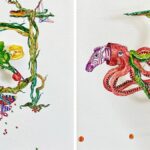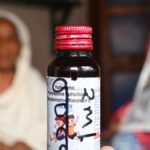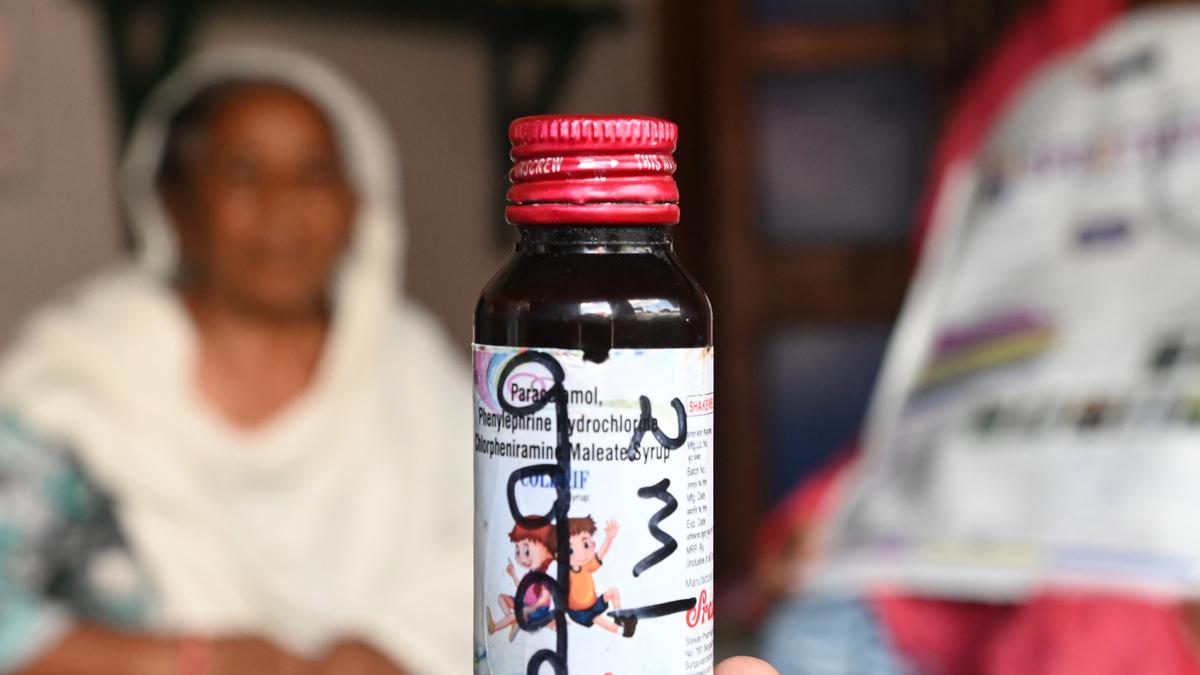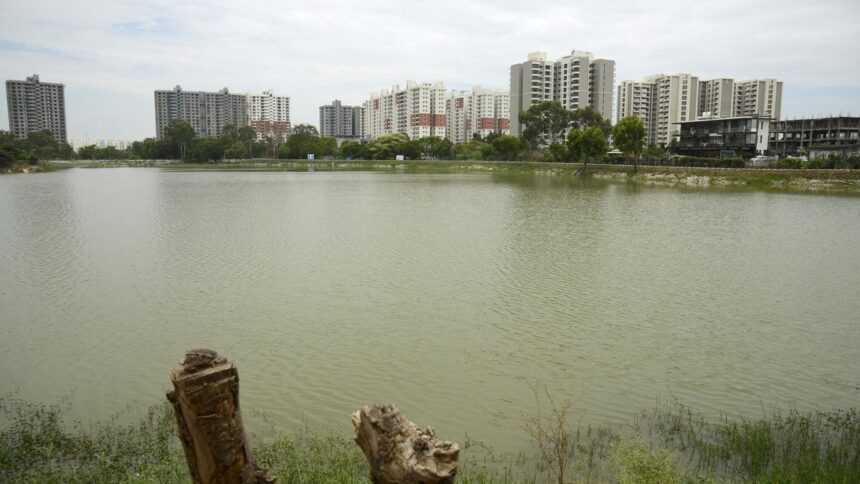The last words Afsana Khan heard from her son, Usaid, were the lines of a nursery rhyme — “Anaar ka meetha daana (The sweet seed of the pomegranate).” A drowsy and weak Usaid had tried to recite the rhyme as he lay in a hospital bed at New Health City Hospital in Nagpur, Maharashtra.
“I was trying to cheer him up. He had started going to nursery school just two months ago, so I asked him to recite the rhyme. He fell unconscious after saying these lines and never woke up,” says Khan, sitting in her two-room house in Parasia town in Chhindwara district of Madhya Pradesh (M.P.), about 150 km away.

On September 13, 2025, Usaid died due to kidney failure, after three sessions of dialysis. He would have turned four on October 10, 2025.
Khan’s younger son, 2-year-old Yamaan, is too young to understand the tragedy. As Khan speaks, Yamaan crawls under a chair and grabs an empty bottle of cough syrup. Khan quickly snatches it from him. “You stay away from this,” she snaps. Hours later, a team from the State Health Department arrives to seize the bottle.
The 60-millilitre bottle of the cough syrup, Coldrif, has been linked to an unfolding tragedy in M.P. Since September, 24 children from the State have died. Most of them were from Chhindwara, while some were from the neighbouring Betul and Pandhurna districts. Three more children remain in a critical condition in Nagpur. The discovery of contamination in the cough syrup points to a larger, dangerous problem — India’s poor regulatory system.
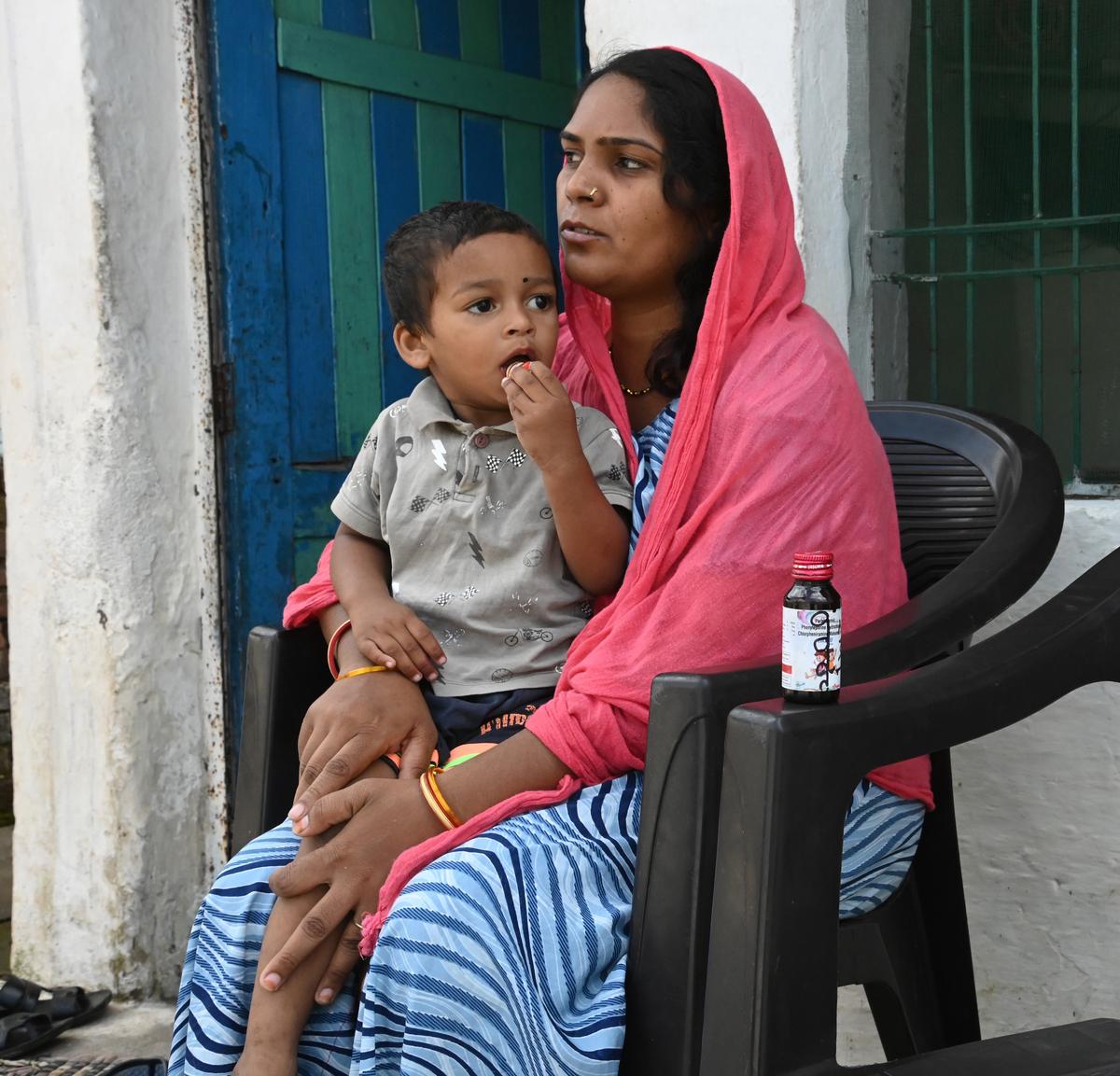
Afsana Khan sits with her son Yamaan. Khan’s 3-year-old son, Usaid, died due to kidney failure after drinking the cough syrup prescribed by a local doctor.
| Photo Credit:
A.M. Faruqui
A dangerous prescription
All the 24 children had one thing in common — they developed a fever and cold, and received treatment in Parasia, a bustling town 30 km from the district headquarters.
Parasia is surrounded by the scenic Satpura mountain ranges and coal mines and is lined with rows of hospitals, clinics, and pharmacies. Among them is the hospital of Dr. Praveen Soni, a popular paediatrician in the area. According to many parents, Dr. Soni prescribed the Coldrif syrup, along with other medicines, for several sick children. Other doctors in town, including Dr. Amit Thakur and Dr. Aman Siddiqui, also allegedly prescribed the same syrup for some other children who reported similar symptoms.
The parents bought the prescribed medicines and went home. They began to worry when their children complained of a stomach ache after drinking the syrup. Soon, worry turned into panic: the children began vomiting and became drowsy. Their small bodies swelled up. Finally, unable to urinate, the children suffered severe kidney damage and died.
Suresh Pipri, a 40-year-old farmer from Parasia’s Sethiya village, recalls the last few days of his 5-year-old daughter’s life. “Rishika was diagnosed with fever on August 25 and received treatment from Dr. Thakur,” says Pipri. “She was prescribed 5 ml of syrup twice a day. When we gave her the first dose, she began vomiting green fluid. She vomited multiple times through the night and complained of a stomach ache. The next day, she stopped talking and recognising anyone.”
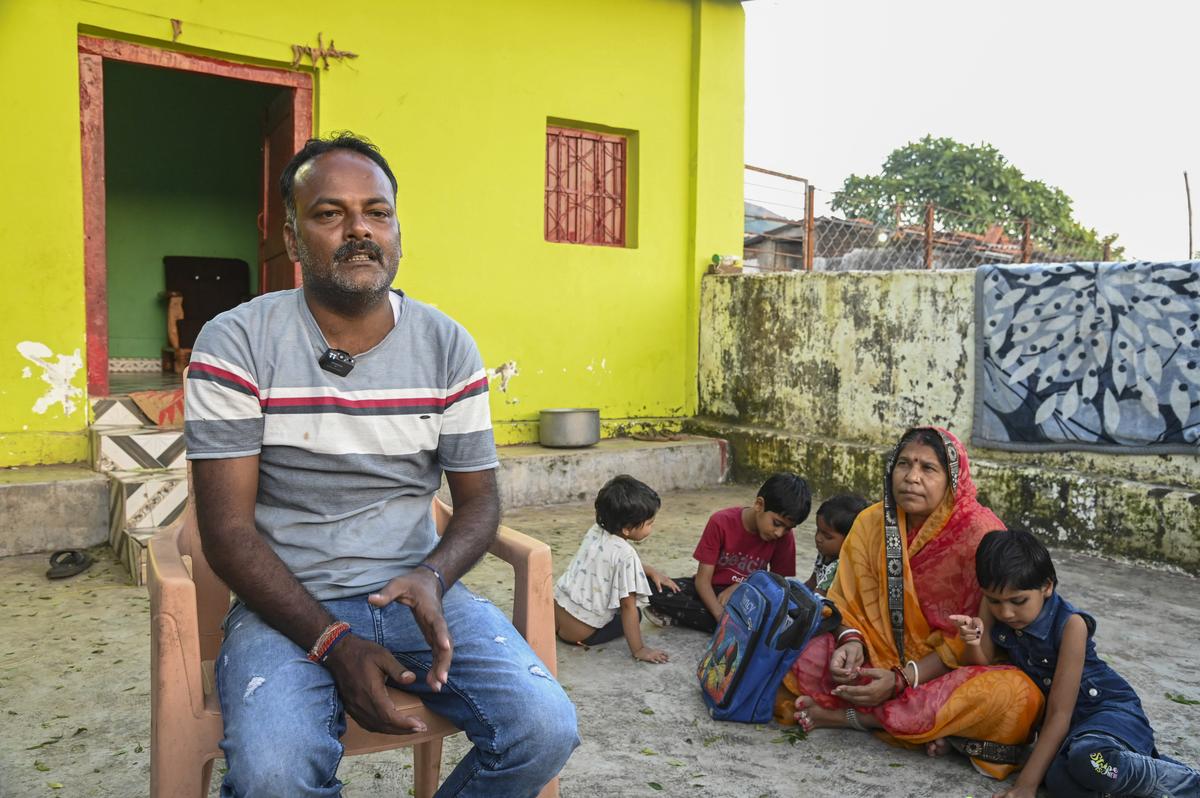
Suresh Pipri, a 40-year-old farmer from Parasia’s Sethiya village, recalls the last few days of his 5-year-old daughter Rishika’s life.
| Photo Credit:
A.M. Faruqui
Pipri took her again to Dr. Thakur, who referred her to a private hospital in Chhindwara city. Despite three days of treatment at the hospital, Rishika’s condition worsened and she was not able to urinate at all, he says.
“On September 2, the doctor conducted a sonography and some other kidney-related tests. The results were not good. Her creatinine levels were extremely high. The doctor referred her to a private hospital in Nagpur,” he says. There, Rishika underwent nine sessions of dialysis. When her condition worsened, she was put on a ventilator for 4-5 days. She died on September 16.
Pipri stares at Rishika’s dance videos on his phone and her drawings. “We did everything we could, but we could not save her,” he says.
A month of deaths and confusion
While most of the children in M.P. had been prescribed the syrup from mid-August onwards, the first death, of 3-year-old Divyansh, occurred on September 2 in a private hospital in Nagpur. More deaths of children were reported on September 4, 7, and 9, but authorities in Parasia and Chhindwara were unaware of the horror.
“Since the children had been referred to private hospitals and had died there, the local health department had no record of them,” says Dr. Ankit Sahlam, Block Medical Officer (BMO), Parasia.
On September 16, after five children had died, health authorities in Nagpur wrote to the Chhindwara district hospital, informing them that children hailing from Parasia, or children who had been referred to hospitals from Parasia block, had died in Nagpur due to kidney failure.
“This is when we started tracing the cause,” says Dr. Sahlam. “Our focus was on finding sources of infection from water, food, or animals. When we found that the children had been treated by local doctors first, we told those doctors to transfer all the children with similar symptoms to the Civil Hospital in Chhindwara.”
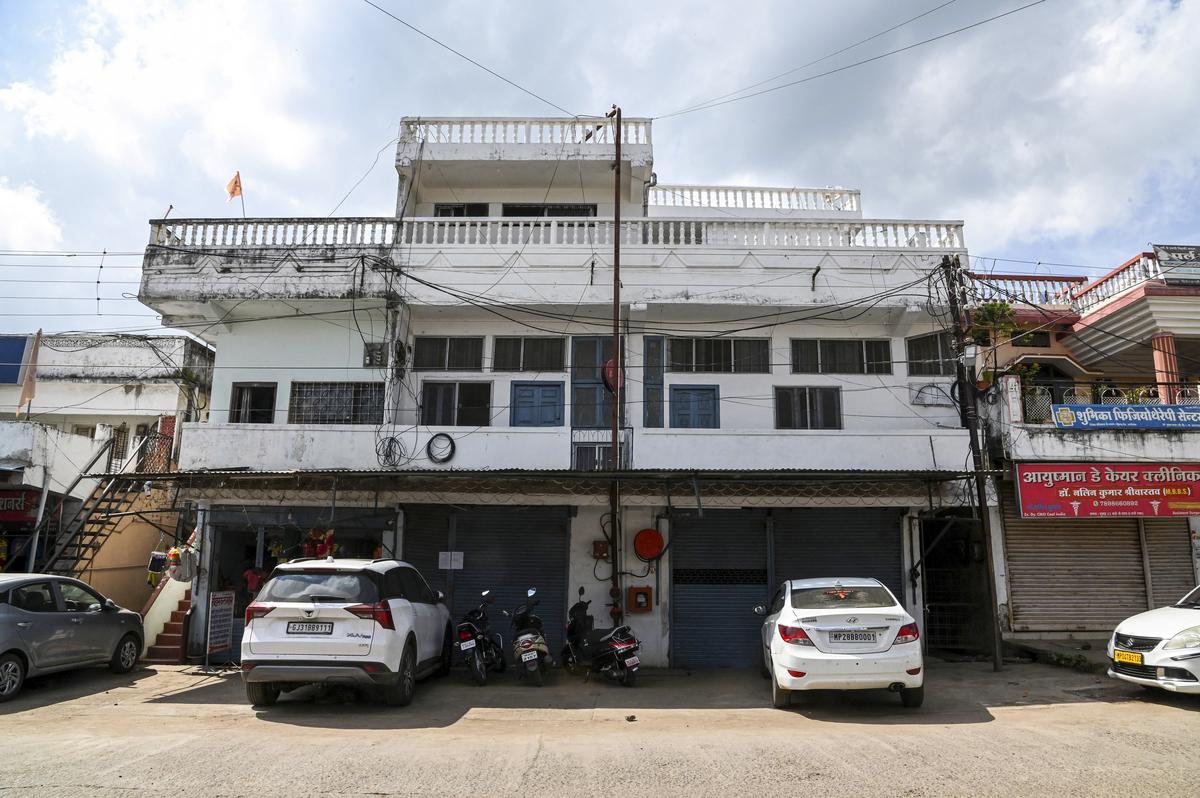
The hospital of Dr. Praveen Soni, who prescribed the cough syrup to several children in Parasia town of Chhindwara district in M.P.
| Photo Credit:
A.M. Faruqui
The Chhindwara authorities failed to trace the cause of the problem. “On September 22, the doctors at the Government Medical College, Nagpur, told us that the kidney damage could have been caused by some medicine,” says the Chief Medical and Health Officer of Chhindwara, Dr. Naresh Gonnade. The doctors also sent the prescriptions issued to the five children in Parasia.
“The Health Commissioner in Bhopal and other State authorities instructed us to launch a campaign to find the medicine that had caused the deaths,” Dr. Gonnade says. The search led to two common cough syrups in the prescriptions — Coldrif and Nastro-DS. Dr. Gonnade says the Drug Inspector of Chhindwara was asked to start collecting samples of the two syrups from pharmacy stores as a precautionary measure.
On September 24, teams of the National Centre for Disease Control, the Central Drugs Standard Control Organisation (CDSCO), and the State surveillance unit of the National Health Mission in M.P. arrived in Chhindwara to investigate the deaths and collect samples.
According to a document of the M.P. Health Department, seen by The Hindu, the teams collected various samples to check for infections and diseases, including Leptospirosis, Chandipura, and Japanese Encephalitis. Tests ruled these out. Finally, the biopsy tests of the kidneys of four of the five children confirmed Acute Tubular Necrosis, an acute kidney injury.
Dr. Sahlam, the BMO of Parasia, says that it was only on September 26 that the authorities suspected Coldrif to be a potential cause. The government seized batches from pharmacies and instructed doctors not to prescribe the syrup.
On October 1, the then Controller of the Food and Drug Administration, Dinesh Kumar Maurya, wrote to the drug control authorities in Tamil Nadu and Himachal Pradesh, asking them to take action in the matter. While Coldrif had been manufactured by Sresan Pharmaceuticals in Kancheepuram in Tamil Nadu, Nastro-DS had been manufactured by Aqunova Pharma, in Himachal’s Solan district. Nastro-DS has since been cleared following tests by the M.P. Food and Drugs Administration (MPFDA).
A high degree of toxicity
With the death toll climbing, the State Health Ministry and the Union Health Ministry sent samples of various medicines for testing.
The Tamil Nadu government ordered inspection and testing of samples as well. It found that one sample of the cough syrup tested showed diethylene glycol (DEG) contamination at a level of 48.6% weight/volume. The government issued a ‘stop production’ order to Sresan Pharma on October 3 and the CDSCO recommended that the company’s manufacturing license be cancelled.
On October 4, the Ministry of Health and Family Welfare said, “Nineteen medicine samples which had been consumed by children were collected from private practitioners and nearby retail stores… Out of the initial 10 samples analysed in the first batch, nine met quality standards. However, one of them, viz. cough syrup Coldrif, contained DEG beyond permissible limits.’’

DEG is a toxic chemical substance typically used in antifreeze solutions for air-conditioners, fridges, and freezers, and as a solvent for products, including cosmetics, at very low concentrations.
According to the CDSCO, DEG replaces pharmaceutical-grade solvents, such as propylene glycol and glycerin, required for safe human consumption. “DEG is cheaper and has a colourless, syrupy consistency and sweet taste like glycerin. It is used by manufacturers to cut costs,’’ says a senior official at CDSCO.
Upon further investigation, the CDSCO identified three products which had been contaminated — Coldrif from Sresan Pharma (Tamil Nadu) showing 48.6% DEG; Respifresh TR from Rednex Pharma (Gujarat) showing 1.342% DEG; and ReLife from Shape Pharma (Gujarat) showing 0.616% of DEG.
In its official statement, the Tamil Nadu Drugs Control Department said the inspection team found several non-compliances at Sresan Pharma. They noticed 39 critical observations and 325 major observations. “It was found that the alleged batch was manufactured using non-pharmacopoeial grade Propylene Glycol as an excipient, which might have been contaminated with DEG and Ethylene Glycol (EG), which are known nephrotoxic and poisonous substances,” it said.
In India, while the Drugs and Cosmetics Act, 1940, and the associated Drugs and Cosmetics Rules, 1945, do not explicitly list DEG by name, they prohibit the use of any substance considered “adulterated” or “substandard”.
Who is responsible?
Contaminated, Indian-made cough syrup is a recurring health hazard. In 1986, at least 14 patients, including a child, died of acute renal failure after being administered glycerol syrup laced with DEG at Mumbai’s J.J. Hospital. In 2022, a number of countries reported that over-the-counter cough syrups for children had been contaminated with DEG and EG. These resulted in the deaths of more than 300 children in Gambia, Indonesia, and Uzbekistan. A lab analysis in Gambia revealed that the product samples contained unacceptable amounts of DEG and EG and that the bottles of syrup had been imported from India. Yet, the problem persists.
Explaining how drugs are licensed in India, Dr. Rajeev Singh Raghuvanshi, head of CDSCO, told The Hindu that health is a State subject. “This means that while CDSCO approves new drugs, clinical trials, and imports, the States handle the licenses for manufacturing, sale, and distribution at the State level,” he said.

Since the findings, the Tamil Nadu Health Department has suspended two senior drug inspectors in Kancheepuram for failing to carry out quality checks and for failing to monitor the drugs manufactured by Sresan Pharma over the last two years. On October 10, Tamil Nadu Health Minister Ma. Subramanian told reporters that while the State had acted against its officials, Central drug inspectors, who are expected to conduct inspections of drug manufacturing facilities across India once every three years, have not done this for six years in Tamil Nadu.
Drugs are licensed in India through a process overseen by the CDSCO and the State Drug Standard Control Organisations (SDSCO), following the guidelines of the Drugs and Cosmetics Act. The process requires making applications, submitting documents, and carrying out inspections to ensure that the drugs are safe, effective, and manufactured under strict quality standards.
An official of the Union Health Ministry says that in the case of Coldrif, the company, Sresan Pharma, got its license from the State government in 2011; this was renewed in 2016. “The company wasn’t in our radar,” the official says.
A senior FDA official in Bhopal in M.P. says if a drug has been approved by the State in which it is manufactured, the maker does not need separate approval to sell it in another State. “No approval was granted to this syrup by the MPFDA,” he says. “But we were responsible for testing random samples of the concerned batch, SR-13 of Coldrif, which we did not do, apart from not having proper sale and distribution records. Three FDA officials have been suspended for negligence.”
The aftermath
On October 9, an M.P. Special Investigative Team arrested G. Ranganathan, proprietor of Sresan Pharma, in Chennai. They sealed his manufacturing facility located along the Chennai-Bengaluru highway.
G. Ranganathan, proprietor of Sresan Pharma, which manufactured the Coldrif cough syrup linked to the deaths of several children in Madhya Pradesh, being produced in Saidapet Court for remand in Chennai.
| Photo Credit:
B. Velankanni Raj
The police also filed a criminal case at Parasia police station against Dr. Soni. They booked him and the directors of Sresan Pharma under Sections 105 (culpable homicide not amounting to murder) and 276 (adulteration of drugs) of the Bharatiya Nyaya Sanhita, 2023, as well as Section 27(A) of the Drugs and Cosmetics Act, 1940, which prescribes penalties for the manufacture, sale, stock, or distribution of substandard and illegal cosmetics.
The Indian Medical Association objected to Dr. Soni’s arrest. Doctors say it is difficult to tell whether a medicine is contaminated simply by looking at it. Many medicines that are contaminated can look, smell, or taste like non-contaminated products. “This is why rigorous and continuous safety checks on medical products to detect and destroy contaminated medicines, whenever possible, is essential,’’ says Dr. Anil Bansal, member of the Delhi Medical Association.
Also read: Cough syrup contamination: Health Ministry directs strict compliance with revised Schedule M norms
The M.P. government is now probing how a large batch of contaminated cough syrup landed in Parasia. “Over 600 bottles of contaminated cough syrup were dispatched from Jabalpur to Chhindwara, with a large batch sent to Parasia,’’ says a source in the Union Health Ministry. The Chhindwara Additional Collector, Dhirendra Singh, says 543 bottles have been seized so far.
Dr. Gonnade says at least 1,000 ASHA workers, 3,000 Auxiliary Nurse Midwives, and several Anganwadi and health workers have been conducting door-to-door surveys since. “They are all hunting for those bottles,” he says.
The CDSCO has asked all the State governments to submit a list of cough syrup manufacturers in their States and has initiated a joint audit of these companies. It has informed the World Health Organization that it has identified and recalled three contaminated cough syrups — Coldrif, Respifresh TR, and ReLife — and halted their production. It has also clarified that none of these products were exported.
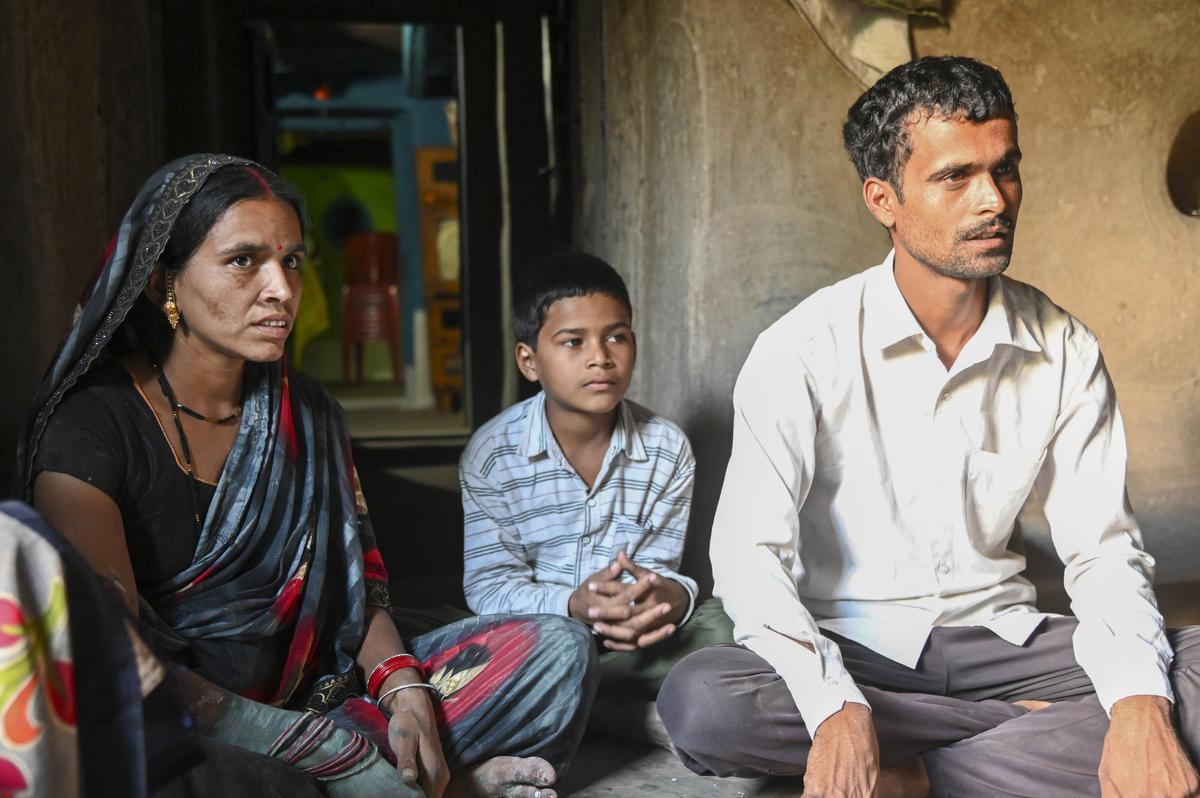
Prabhu Dayal Yaduvanshi and Kunti Yaduvanshi sit with their elder son Jitendra at their home in Dighavani village in Madhya Pradesh’s Chhindwara. Their younger son, Vikas, died after having Coldrif.
| Photo Credit:
A.M. Faruqui
In Dighavani village, about 15 km from Parasia, Prabhu Dayal and Kunti Yaduvanshi sit in darkness. Their younger son, Vikas, caught a fever on September 19 and was prescribed Coldrif by Dr. Soni. “By the time we reached Nagpur on September 22, the doctors said they were suspicious of the syrup and were testing it. Did he [Dr. Soni] not know that this syrup had already killed children? What was the government doing,” asks Dayal. All they are left with is a passport-sized photo of Vikas; he died on September 27.
With inputs from Serena Josephine M. in Tamil Nadu



